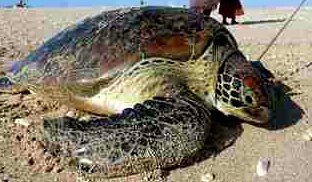By Charlie Moffat, BV Volunteer, Andavadoaka, Madagascar. Turtle hunting is illegal in Madagascar, but despite this, BV have found that a huge amount of turtle hunting continues – the estimated catch of turtles in Southwest Madagascar is between 10,000 and16,000 (Humber et al., 2010). Following the success of the Rare and BV social marketing campaign last year, BV are keen to tackle the problem of turtle hunting within Velondriake. For the past four weeks, I have been working with Gildas, Rare Pride Campaign Manager, and Kame, Velondriake MPA Project Coordinator, conducting some research into the traditions and customs that surround turtles, and the barriers that may prevent a successful turtle conservation social marketing campaign. So far we have held focus groups and key informant interviews (usually with the village nahoda, or elder) in eight villages within Velondriake.
The focus groups and interviews have been an amazing experience, travelling to different villages within Velondriake to interview the nahodas, and groups of Vezo fishermen, gaining a deeper understanding of village life, and the local traditions. On one of the most memorable trips so far, Kame, Silvere, Shark and Turtle Research Assistant, and I took a journey to some of the villages north of Andavadoaka.
We set off early one morning following a breakfast of sugary coffee and boka boka, on a pirogue sailed by our experienced Vezo fisherman and his young assistant. It was a beautiful morning, the sea was very calm, and we had a relaxing sail over to a small island called Nosy Hao, which is inhabitated by one couple (the nahoda, and his wife), some of their twenty children, and some of their children’s own families. Amazed at how great the wife looked, having had given birth to so many children, we conducted our interview in the nahoda’s small wooden hut, thanked them, and set off for our next stop. Over the remainder of the day we stopped off in an additional six villages, made it to Morombe before dark, found somewhere to stay and got some dinner, feeling particularly pleased with how much we had fit into just one day.
The following day, after a breakfast of boka boka and coffee, and a couple of morning meetings, we were ready to head back to Andava. Unfortunately the wind had different ideas. There was a strong northerly wind, which meant we were unable to sail south, we would have to wait until the wind changed direction, which the Vezo predicted would be at approximately 7am the following morning. Having been in Andava for the last five weeks, I was initially excited about the possibilities of a big town, with 24 hour electricity. However, after a look around the market and along the beach, it was clear that there was not too much more to be seen. So we whiled away the afternoon watching the world go by, sampling banana boka boka, and after weeks of dreaming about ice cream, a delicious frozen yoghurt.
The following morning came, and the Vezo predictions for the wind unfortunately had not come true. After a breakfast of, yep, you guessed it, boka boka and coffee, we set off anyway, hoping that the wind would pick up and that we would make good time to get back to Andava before lunch. This, it turned out, was massively overambitious. Instead, it took us three and a half hours to reach Nosy Be, with the opposite journey two days previous having taken just forty-five minutes. We had a ‘quick’ stop off in Nosy Be, only to then find that we were stranded due to the incoming tide. More boka boka and coffee were consumed, and this stop gave me a fantastic opportunity to see the locals collecting octopus on the second day of the national octopus opening.
Four hours later, as the tide receeded, we set out cautiously trying to avoid the rocks in the still dangerously low tide. Eventually we made it out to the open sea, and crawled along at a snails pace. Hours passed as we zig-zagged across the sea trying to cut into the strong wind which seemed determined to push us in the opposite direction. I began to get the feeling of being shipwrecked at sea. The waves started to get bigger, and before long it was like we were on a ride at a theme-park, riding up and down in the sea, with water splashing in with huge force soaking us from head to toe. For the first time since being here, I actually experienced feeling cold.
Eventually the experienced pirogue sailors decided enough was enough, and they pulled into shore at the next village. It seemed that the wind and the sea had finally beaten us. We pulled our dishevelled, soaked selves off the boat, as the sailers pulled down the sails and decided to sit it out for another night. It seemed nature had won. What else were we to do, but to sit down for another round of boka boka and coffee, and wait.




